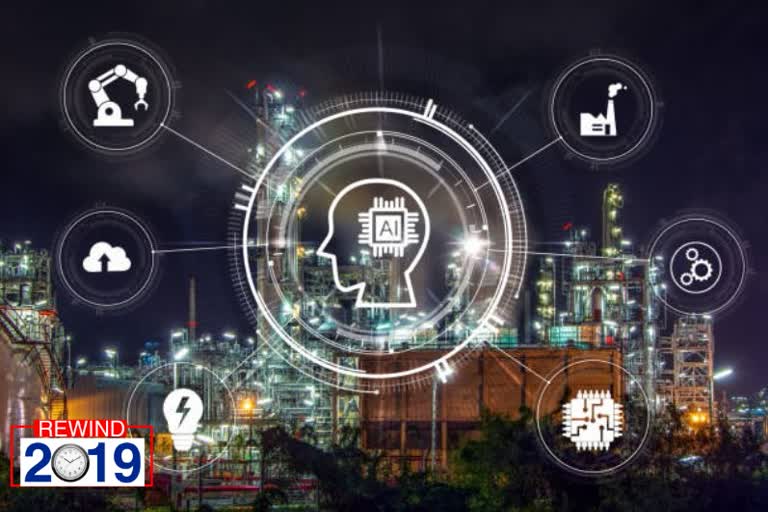New Delhi: Automation and AI continued to log in multi-million dollar prospects for Indian IT companies despite slower overall growth and visa concerns in an eventful year that was marked by high-drama of a hostile takeover at Mindtree, change of guard at Wipro, and whistleblower allegations against Infosys top leadership.
In a departure from the past, industry body Nasscom discontinued providing its annual growth forecast for the industry -- an important tool to gauge the sentiment of the sector.
For 2019, Nasscom said it was "cautiously optimistic" and cited rising global economic uncertainties arising out of trade wars and protectionism.
The industry is focussing on new-age technologies like robotics, artificial intelligence (AI) and machine learning to not just help customers stay ahead in the game but also remain competitive themselves.
The advent of new technology paradigms like robotics, AI, blockchain and IoT is changing how companies and individuals consume technology and for the Indian businesses to remain successful, an update to the technology of tomorrow, today will be needed, Nasscom Senior VP and Chief Strategy Officer Sangeeta Gupta said.
With automation and artificial intelligence increasingly becoming an integral part of business, concerns around layoffs also continued to linger through the year.
At the end of October, US-based Cognizant said it planned to slash up to 7,000 jobs as part of cost-reduction efforts. Infosys too was reported to be mulling firing thousands but the company clarified that there were no planned layoffs.
However, industry leaders sought to allay apprehensions on job losses and maintained that industry continues to be a healthy net hirer.
"The IT industry continues to hire in large numbers. The sector, in fact, expected net hires to total about 1.2 lakh last year and ended up hiring 1.7 lakh. This year, in the first quarter itself, 85,000 net new hirings have taken place," WNS Group CEO and Nasscom Chairman Keshav Murugesh said.
He further stated: "Considering that the industry has witnessed a positive hiring trend, from Nasscom's point of view, we are cautiously optimistic in terms of the overall year and aim to see this trend continue in the coming year".
Read more:Jet shut, AI on edge, hopes fly high for aviation in 2020
The year 2019 saw change of guard at one of India's biggest IT companies. Wipro founder Azim H Premji, who turned a small vegetable oil producer into a USD 8.5 billion software behemoth, retired as the company head in July-end, handing over the reins to his son, Rishad.
It was also an exciting year in the Indian IT sector in terms of M&As. Baring Private Equity Asia (BPEA) bought about 30 per cent share in NIIT Technologies in a Rs 2,627 crore deal.
Besides, hostile takeover bid added that dramatic, edge of the seat moment to the year when Larsen & Toubro bought 20.32 per cent shares in Mindtree from V G Siddhartha and his coffee enterprise for over Rs 3,000 crore in March. And then it mounted a takeover bid picking up more share purchases from the open market and eventually making an open offer.
Mindtree's larger rival Infosys had its own battle to fight.
While Infosys had battled allegations of governance lapses in 2017 against the then CEO Vishal Sikka and certain Board members, this year saw anonymous whistleblowers alleging that CEO Salil Parikh and Chief Financial Officer (CFO) Nilanjan Roy inflated revenues. The issue continues to be probed.
The US continues to be an important market for the Indian IT services players, accounting for over 60 per cent of the export revenues. While Indian companies have ramped up local hiring in these markets, there continue to be challenges on the regulatory front in terms of visa-related issues.
The most recent example is the S. 386 - a bill that seeks to bring in amendments to the Immigration and Nationality Act to eliminate the per-country limitation for employment-based immigrants. However, another provision will bar 50:50 companies (those with 50 employees and more in the US or with 50 per cent of staff on H-1B work visas) from bringing in more employees on H-1B into the US.
"Nasscom strongly supports eliminating the per country caps on Green Cards as was the original intent of S. 386, the Fairness For High-Skilled Immigrants legislation. However, Nasscom is opposed to both the process being followed and discriminatory provisions of the bill that deal with the unrelated matter of H-1B visas," Gupta said.
Back home, certain provisions of the data protection bill has the industry experts, up in arms. Apart from clauses that could impinge on privacy of Indian citizens, there are areas that could create challenges for businesses, experts rued.
For instance, the draft personal data protection bill seeks to empower the Centre to exempt any government agency from the provisions of the proposed legislation. This has the industry worried, as experts warn that such exemptions represent "new, significant threats" to the privacy of Indians.
Inclusive innovation at scale rather than scaling IT services today is the new moolah and core of IT services, Sood said adding that in order to accelerate the technological growth, India needs to attract more foreign investment, offer tailored upskilling programs, retain home-grown talent, as well as create a favourable regulatory environment.
The Indian IT services sector will have to maintain a fine balance between driving innovative solutions and grappling with the challenges that these solutions may bring up. And do it at a faster pace as lines between the physical and digital worlds continue to blur.



